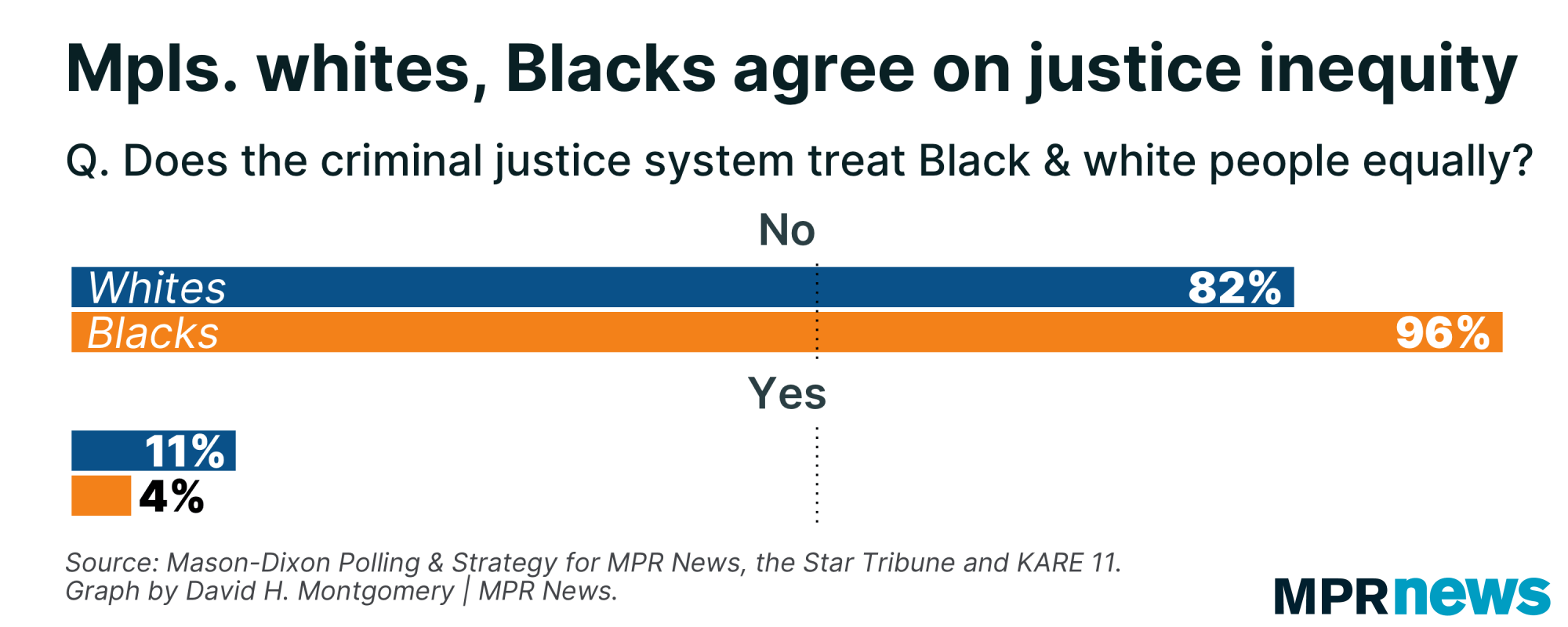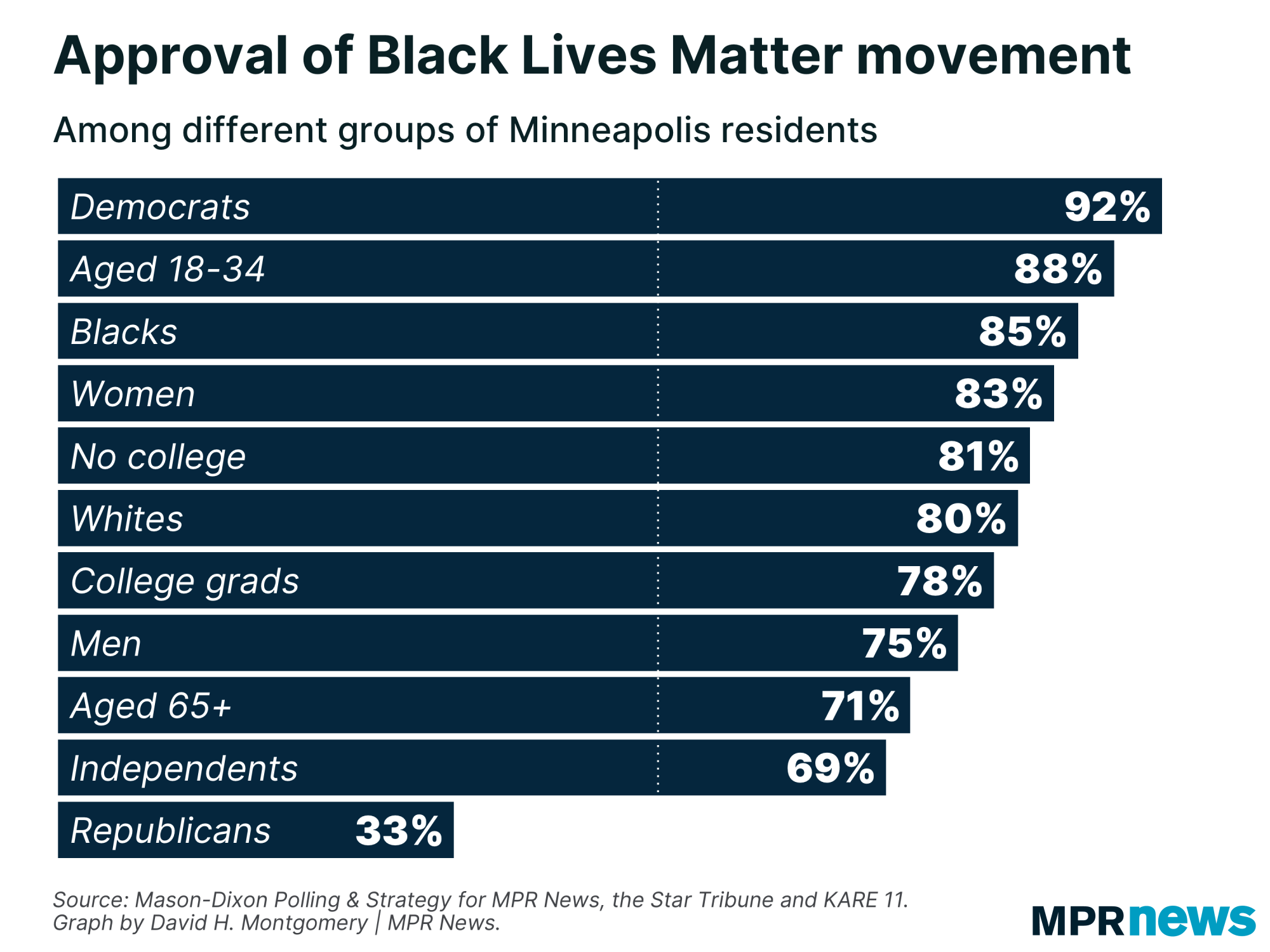Poll: Most Mpls. voters see Floyd killing as part of racist policing pattern

Go Deeper.
Create an account or log in to save stories.
Like this?
Thanks for liking this story! We have added it to a list of your favorite stories.
More than 8 in 10 Minneapolis voters say the killing of George Floyd by police was not an isolated incident, but rather a sign of larger problems in how the city’s Police Department treats Black people, according to a new MPR News/Star Tribune/KARE 11 poll.
The poll also found overwhelming support for Black Lives Matter, with 8 in 10 voters supporting the movement.

Black respondents were particularly clear in their views on the criminal justice system, with 96 percent saying the system does not treat Black and white people equally. Four percent said it does. None of the 500 Black voters polled said they weren't sure — that was the only question in which no respondent said they hadn't made up their mind.
To poll respondent Ryan Hamilton, inequality in the criminal justice system is a given, considering America's history.
Turn Up Your Support
MPR News helps you turn down the noise and build shared understanding. Turn up your support for this public resource and keep trusted journalism accessible to all.
"We had slavery in this country, folks,” said Hamilton, who identifies as a Black descendant of slavery.

Institutions, including the criminal justice system, were built by people who were overtly racist, he said.
"Those systems are still in place,” he said, “so we're going to have to go back and change the policies and change the laws, where appropriate, to account for when overt racism was fashionable."
The survey of 800 registered Minneapolis voters was conducted by Mason-Dixon Polling between Aug. 10 and Aug. 12. In a parallel effort, the poll interviewed an additional 354 Black Minneapolis voters between Aug. 6 and 12, for a total of 500.
The larger poll has a margin of error of plus or minus 3.5 percentage points. The parallel survey of Black voters has a margin of error of plus or minus 4.5 percentage points.

The poll found that 80 percent of Minneapolis voters have a favorable opinion of Black Lives Matter. About 92 percent of Democrats said they favored it, while a majority of Republicans said they have an unfavorable view. In the aftermath of the police killing of Floyd, the national network and the movement it launched became even more visible than it had in past protests.
A majority of poll respondents also said the Minneapolis Police Department has a bad track record when it comes to its treatment Black people. About 85 percent said Floyd’s killing was a sign of broader problems within the department. That sentiment was shared by people across different racial and ethnic groups.

Answers to the question differed most widely among party affiliation. Thirty-eight percent of people who self-identified as Republicans said Floyd's killing was an isolated incident. Eighteen percent of independents and only 6 percent of Democrats thought so.
Scott Chumbly, who works for a company that installs large-scale security systems, is white and identifies as a political independent. While every profession has members that abuse their power, he said he doesn't think Minneapolis police are routinely singling out Black people for mistreatment.
"I've since seen all the video,” Chumbly said, referring to footage showing Floyd’s final moments of life while in the custody of Minneapolis police. “I don't believe the situation with George Floyd had anything to do with race."
While 81 percent of Black respondents said Floyd’s killing was part of a larger problem, a slightly bigger share of white voters — 88 percent — found it to be true.
Stephanie Erickson, who is white, said Floyd's death may have surprised people around the country because Minnesota has a reputation for a high standard of living.
"It's never been that way for Black people that are here,” she said. “They've never had access to the good schools that we're known for or the public amenities that there's access to."
The mass protests against police brutality and systemic injustice that followed Floyd's killing focused a laser light on racial disparities that have long meant worse health, education outcomes for many Minnesotans of color, as well as more limited access to housing and employment. African Americans also disproportionately fill jails and prisons across the state.
Like other cities across the country, Minneapolis is struggling with how to best address racial inequality. The task is particularly more challenging as the pandemic has exacerbated already existing health and employment gaps between whites and people of color.
"I would say we have a lot of work to do in Minneapolis,” Erickson said. “But I don't think any of it is unique to Minneapolis, either."


